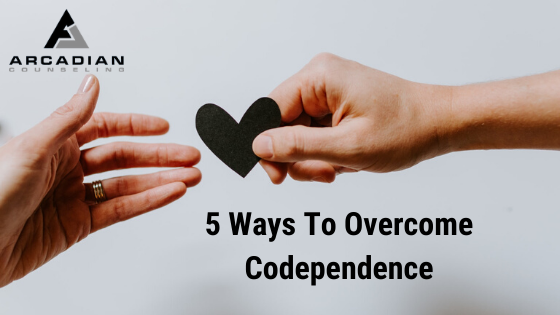Do you find you accept responsibility for a loved one’s emotions or actions?
Are you constantly trying to please others?
Do you neglect your own needs and have difficulty setting realistic personal boundaries?
Do you often feel resentful, yet have difficulty stepping away from a dysfunctional relationship?
These are some of the symptoms of codependency.
Codependent people look for external cues from others to tell them what they should feel, need and act like. While most would agree that sensitivity to others is a wonderful trait, codependent individuals take it to an extreme because of an inability to create healthy boundaries.
But healthy boundaries are vital. These boundaries draw a line of distinction and responsibility between our own thoughts, feelings, and behaviors and the thoughts, feelings and behaviors of others.
While it may take time to break a lifelong pattern of codependency, here are five things you can do to overcome it.
Recognize Any Denial
The first step is to be honest with yourself and acknowledge the problem. There is a very good chance you have rationalized your codependence overtime. While it can feel scary to admit to being involved in a dysfunctional relationship, honesty is the first step toward healing. Chances are the mere fact that you are reading this is an indication of an awareness of a problem. Rather than beat yourself or run from unpleasant feelings that come with this awareness, take a moment and acknowledge your desire to cultivate more fulfilling relationships.
Study your past
The next step on your path to recovery is to take a look at your family history to uncover experiences that may have contributed to your codependence. What is your family history? Where their events that led to you disconnecting from your inner-emotions?
This can be quite a difficult process and one that involves reliving childhood emotions. You may find that you feel guilty for admitting you were wounded in your younger years. This type of work can be difficult and is best done in a safe therapy relationship.
Detach from Unhealthy Relationships
In order to truly work on ourselves, we have to first detach from what we are obsessed with. Personal growth will require giving up the over-involvement or preoccupation with trying to change, control, or please someone else. This means letting go and acknowledging we cannot fix problems that are not ours to fix. Once we truly let go of this binding tether, we begin to feel a sense of freedom or lighter. Things feel a little easier and not so heavy.
Learn Self-Care
Letting go of your need to please others is a good start to healing, but learning self-care is crucial. It’s important that you begin to become aware of your own thoughts, feelings and needs, and learn how to communicate them in a relationship. This may feel off at first, like you’re being incredibly selfish. But that’s OK – it’s to be expected. Allow space for this awkwardness to be present but don’t try to run from it. A great way to begin this process is through simple mindfulness exercises and mindful breathing techniques. In order to form healthy relationships with others, you must first form one with yourself.
Get Comfortable With Saying “No”
One of the best ways you can begin to set healthy boundaries is to learn to say no to situations that are detrimental to your own well-being. This will feel uncomfortable at first, but the more you do it, the easier it will become. It also should be noted that when beginning to implement this specific type of change, you can expect a reaction from others who are used to hearing the standard “yes.” Others typically do not like when the rules are changed – especially when they have always been in their favor. And especially those that are used to taking advantage of others.
Seeking the support and guidance of a therapist can be tremendously helpful as you work your way through the steps. Therapy and counseling can help you to safely explore your painful feelings and experiences and learn healthy ways of relating to yourself and others.
James Killian, LPC is the Principal Therapist & Owner of Arcadian Counseling in New Haven, CT where they specialize in helping over-thinkers, high achievers, and perfectionists take control and move From Surviving to Thriving.



